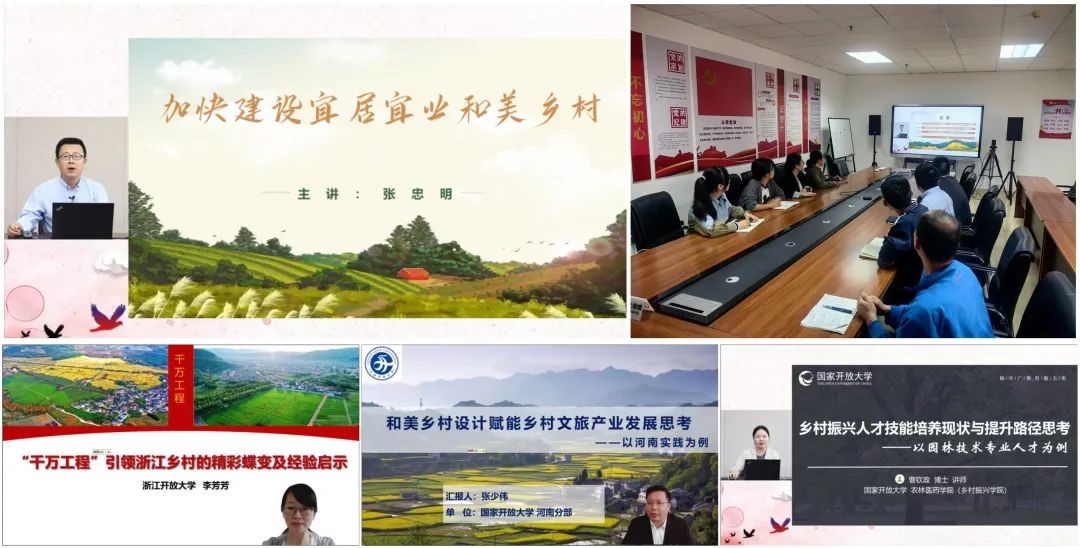 It is stated in the No. 1 central document for 2024 to learn and apply the experience from the Green Rural Revival Programme in Zhejiang Province to vigorously and effectively promote the all-round rural revitalisation, and it is underscored at the Third Plenary Session of the 20th Central Committee of the Communist Party of China (CPC) to apply the experience gained from the Green Rural Revival Programme in Zhejiang Province to refine the long-term mechanisms for promoting all-around rural revitalisation.
It is stated in the No. 1 central document for 2024 to learn and apply the experience from the Green Rural Revival Programme in Zhejiang Province to vigorously and effectively promote the all-round rural revitalisation, and it is underscored at the Third Plenary Session of the 20th Central Committee of the Communist Party of China (CPC) to apply the experience gained from the Green Rural Revival Programme in Zhejiang Province to refine the long-term mechanisms for promoting all-around rural revitalisation.
To implement the guiding principles of the Third Plenary Session, the Open University of China (OUC) recently held an event themed “Study and Apply the Green Rural Revival Programme to Support the All-Round Rural Revitalisation” as part of the “Lectures by Famous Teachers from 100 Universities” and the Academic Salon activities of the open-university system. The event focused on building beautiful and harmonious rural areas and invited authoritative experts and outstanding young scholars from within and outside the system to share insights based on their research and work achievements.

Zhang Zhongming, director of the Agricultural Engineering Information Institute at the Academy of Agricultural Planning and Engineering of China’s Ministry of Agriculture and Rural Affairs, delivered a report titled “Accelerating the Construction of Liveable and Business-Friendly Beautiful and Harmonious Rural Areas”. With abundant practical cases, Zhang provided an accessible analysis of the meaning of beautiful and harmonious rural areas for people to live and work in, as well as a new historical starting point for building such places. He introduced successful cases and insights from various models of building beautiful and harmonious rural areas, such as industry-driven, urban-suburban intensive, reform-driven, ecological development, and cultural inheritance models, and clarified the ideas, theories, and pathways for promoting the stable and sustainable development of building beautiful and harmonious rural areas.
Three young teachers from the system, including Li Fangfang from the Zhejiang Branch, Zhang Shaowei from the Henan Branch, and Cao Qinzheng from the headquarters, shared their insights and reflections based on their practical experiences and thinking in serving rural revitalisation. They respectively gave engaging presentations titled “The Inspiring Transformation and Insights of Zhejiang Villages Led by the Green Rural Revival Programme”, “Thoughts on Designing Beautiful and Harmonious Villages to Empower the Development of Rural Cultural and Tourism Industry”, and “Current Status and Thoughts on Improvement Pathways for Talent Skill Development in Rural Revitalisation: A Case Study of Landscape Technology Professionals”.
Zhang Zhongming provided feedback on the presentations of the three young teachers. He stated that the Green Rural Revival Programme is a major decision personally planned, deployed and promoted by General Secretary Xi Jinping during his tenure in Zhejiang. Over the past 20 years of comprehensive implementation, the Green Rural Revival Programme has profoundly transformed the rural landscape of Zhejiang, creating thousands of beautiful villages and benefiting numerous farmers. It has promoted the organic integration of the green ecology, prosperous economy, and good life, providing successful examples and models to accelerate the construction of liveable and business-friendly beautiful and harmonious rural areas in various regions. The three young educators conducted in-depth research and discussions from multiple perspectives, including typical practices in building beautiful and harmonious villages, plans and designs of rural cultural and tourism industry, and talent cultivation for beautiful and harmonious villages. Their work is highly relevant and practical, reflecting the contributions of teachers within the open-university system to solidly advancing the national rural revitalisation strategy.
Li Guangde, dean of the OUC School of Agroforestry and Medicine (Rural Revitalisation College), stated that the vast number of faculty and students are both witnesses to rural revitalisation and builders and participants in the process. The content of this event was rich and the cases were vivid, serving as a concrete measure to implement the guiding principles of the Third Plenary Session of the 20th CPC Central Committee and to inspire faculty and students to engage in the practice of promoting the rural revitalisation on all fronts.
The event has attracted active attention from faculty and students within the open-university system, with around 1,170 views. Many said that they benefited greatly from the event, as it not only expanded their professional horizons but also opened up new arenas for development. All of them are determined to commit themselves to making positive contributions to advancing all-round rural revitalisation through practical actions based on their work responsibilities.
By Cao Qinzheng, OUC